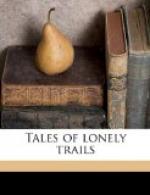The cave-man stalked from his hole under a cliff, boldly forth with his huge club or stone mace. Perhaps he stole his neighbor’s woman, but if so he had more reason to hunt than before—he had to feed her as well as himself. This cave-man, savagely descended, savagely surrounded, must have had to hunt all the daylight hours and surely had to fight to kill his food, or to keep it after he killed it. Long, long ages was the being called cave-man in developing; more long ages he lived on the earth, in that dim dark mystic past; and just as long were his descendants growing into another and higher type of barbarian. But they and their children and grandchildren, and all their successive, innumerable, and varying descendants had to hunt meat and eat meat to live.
The brain of barbarian man was small, as shown by the size and shape of his skull, but there is no reason to believe its construction and use were any different from the use of other organs—the eye to see with—the ear to hear with—the palate to taste with. Whatever the brain of primitive man was it held at birth unlimited and innumerable instincts like those of its progenitors; and round and smooth in babyhood, as it was, it surely gathered its sensations, one after another in separate and habitual channels, until when manhood arrived it had its convolutions, its folds and wrinkles. And if instinct and tendency were born in the brain how truly must they be a part of bone, tissue, blood.
We cannot escape our inheritance. Civilization is merely a veneer, a thin-skinned polish over the savage and crude nature. Fear, anger, lust, the three great primal instincts are restrained, but they live powerfully in the breast of man. Self preservation is the first law of human life, and is included in fear. Fear of death is the first instinct. Then if for thousands, perhaps millions of years, man had to hunt because of his fear of death, had to kill meat to survive—consider the ineradicable and permanent nature of the instinct.
The secret now of the instinctive joy and thrill and wildness of the chase lies clear.
Stealing through the forest or along the mountain slope, eyes roving, ears sensitive to all vibrations of the air, nose as keen as that of a hound, hands tight on a deadly rifle, we unconsciously go back. We go back to the primitive, to the savage state of man. Therein lies the joy. How sweet, vague, unreal those sensations of strange familiarity with wild places we know we never saw before! But a million years before that hour a hairy ancestor of ours felt the same way in the same kind of a place, and in us that instinct survives. That is the secret of the wonderful strange charm of wild places, of the barren rocks of the desert wilderness, of the great-walled lonely canyons. Something now in our blood, in our bones once danced in men who lived then in similar places. And lived by hunting!




